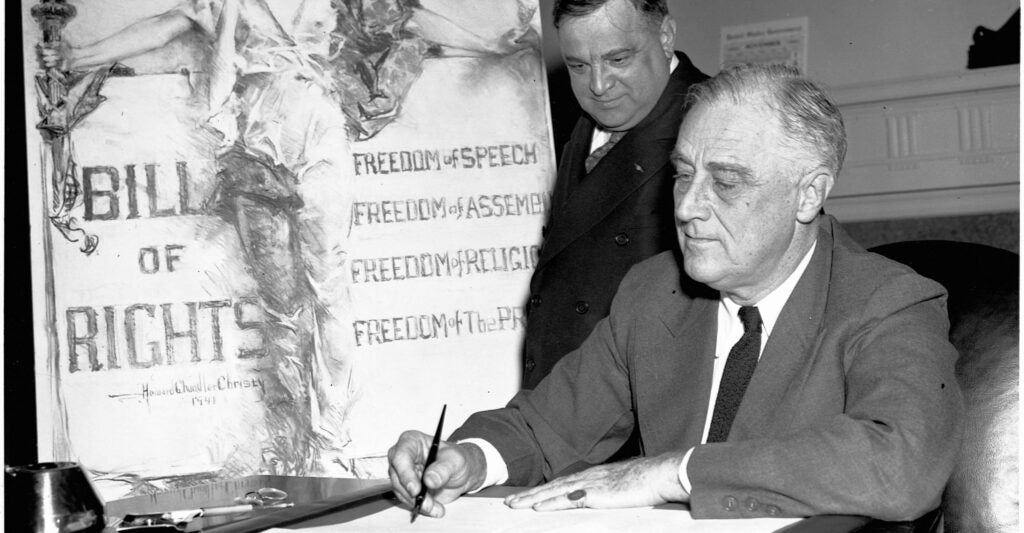Sigh. Here we go again.
The 2016 Democratic Party platform proudly proclaimed, “We believe as Democrats that health care is a right, not a privilege.” In 2020, the party doubled down, saying, “We must guarantee health care, not as a privilege for some, but as a right for every single American.”
The drumbeat continued in the 2024 Democrat platform: “Health care should be a right in America, not a privilege.”
This is nothing new.
Decades before Hillary Clinton, Bernie Sanders, Joe Biden, and Kamala Harris began chanting the mantra, leftists all kinds have seemed to believe endlessly repeating “health care is a right” will somehow make it true.
But it’s not. And claiming it to be one is lazy, ignorant of natural law, or just plain deceptive.
It’s important to first clarify that proponents of health care being a right are ultimately advocating for universal health insurance. All Americans already have access care at some level. More than 90% of the population is covered by private plans, Medicare, or Medicaid, and even those with no insurance whatsoever can’t be turned away from an emergency room for financial reasons.
Admittedly, that’s a limited and inefficient option that satisfies no one, but it’s the paying for health care, not the provision of it, that’s the core issue.
That pinpoints the problem of claiming health care as a right; namely, it ain’t cheap. I don’t know anyone who isn’t in favor of all Americans having convenient access to high quality care, but its provision, like the provision of any service, requires the labor of others.
That’s something no one can presume. As the cliché goes, your rights to swing your fist stop at the tip of my nose.
“Free” health care requires doctors, nurses, techs, and all the people who provide the equipment, machinery, medicine, and supplies in the vast health care system to unwillingly bear the cost. That’s not only immoral, it’s unsustainable. If beer, bread, and basketballs were free, there would soon be no beer, bread, and basketballs.
English Enlightenment-era philosopher John Locke wrote that we are all born with inalienable natural rights that are God-given and can never be taken away. Among the rights Locke cited were “life, liberty, and property,” the latter of which was exchanged for “the pursuit of happiness” in the Declaration of Independence.
Note, however, that none of those rights require the labor of others. Even the last one is a right only of pursuit, not attainment. Government is there to protect our rights, not provide them.
The confusion in our understanding of what constitutes a right dates to the early progressive movement. It was expressed in full illusory flower by President Franklin D. Roosevelt in his 1944 State of the Union address.
“As our nation has grown in size and stature,” Roosevelt said, our “political rights proved inadequate to assure us equality in the pursuit of happiness.” He proposed a “Second Bill of Rights” that included the right to “a useful and remunerative job,” to “earn enough to provide adequate food and clothing and recreation,” to “a decent home,” to “a good education,” to “adequate protection from the economic fears of old age, sickness, accident, and unemployment,” and yes, to “adequate medical care.”
What a wonderful world it would be if all these things could be ours simply by declaring them to be rights. Unfortunately, somebody must pay for them.
Roosevelt’s folly was never introduced in Congress, but it did inform the United Nations’ Universal Declaration of Human Rights, ratified in 1948. This international wish list guarantees, among many other things, “the right to rest and leisure,” including “periodic holidays with pay” (Article 24); the right to “food, clothing, housing and medical care” (Article 25); and “the right to free elementary education” (Article 26).
It’s interesting to note that Article 26 goes on to say that “Parents have a prior right to choose the kind of education that shall be given to their children,” which is not something you’ll see quoted by today’s progressives.
All of this demonstrates the untenability of claiming rights based on human aspirations rather than natural realities. All rights are good things, but not all good things are rights. If our duly elected legislature one day passes a law that somehow finds a way to deliver health insurance for all, that’s its prerogative (assuming it passes constitutional muster). But that still won’t make it a right.
In the preamble to his laundry list, Roosevelt said, “People who are hungry and out of a job are the stuff of which dictatorships are made.” What he failed to mention is that government seizing the fruit of people’s labor without their consent is what dictatorships do. His Second Bill of Rights was, in every sense of the phrase, a bill of goods. Ambitious politicians to this day are still asking us to buy it.
We publish a variety of perspectives. Nothing written here is to be construed as representing the views of The Daily Signal.
